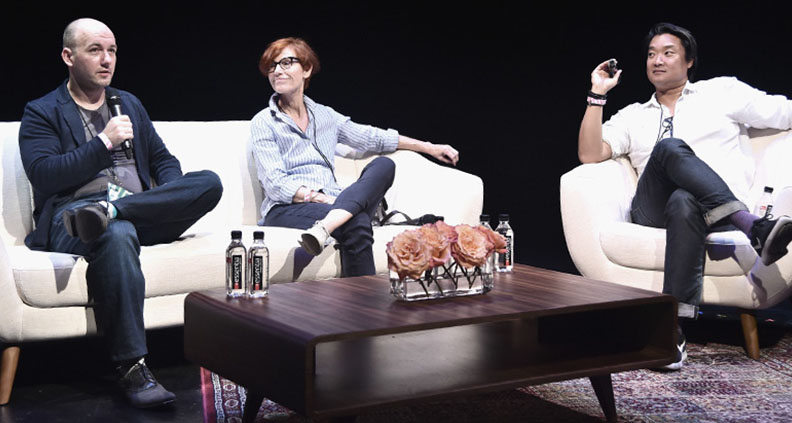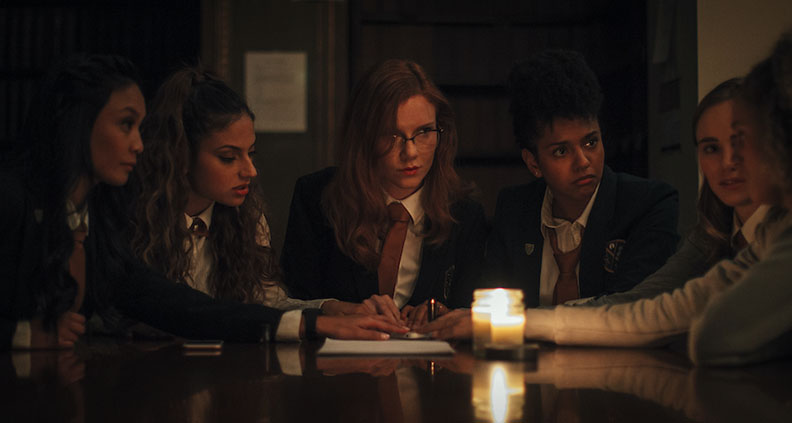Interview: Genre Master Simon Barrett Conjures Directorial Debut ‘Séance’
Though plenty try, it’s not often that the insular world of horror cinema deigns admittance to its new cult canon. But filmmaker Simon Barrett has already achieved midnight movie immortality at least twice over, with 2011’s jaunty home invasion thriller You’re Next and 2014’s unclassifiable super-soldier actioner The Guest—to say nothing of 2016’s criminally underrated Blair Witch sequel/reboot, practically guaranteed for rediscovery and a hearty reappraisal any day now.
As writer and producer, Barrett created each of these films—as well as 2010’s A Horrible Way to Die—in collaboration with director Adam Wingard. But with Wingard off wrangling kaiju as the skipper of Godzilla vs. Kong, Barrett was free to step into the director’s chair to helm the stylish new chiller Séance. Based on his own script and marking Barrett’s feature directorial debut, Séance stars Suki Waterhouse and is currently playing in select theaters and streaming on VOD.
Set at an anachronistic all-girls boarding school, where a series of campus pranks soon take a deadly (and potentially supernatural) turn, Séance’s unique blend of slasher grit, giallo gore and Scooby Doo capering combine for an entertaining and oddly sincere horror flick, perfect for late nights and deep bowls of popcorn.
We recently spoke to Barrett about the film, donning the director’s jodhpurs and just what it took to conjure up Séance as his first feature.
SIMON BARRETT

The thing that jumped out to me about Séance when watching it is that, if you’re a big horror nerd like I am, you can recognize all of these influences—Suspiria, Scream, The Dream Warriors, which are all very different types of horror movie—but that you draw from all these different elements to create a tonally cohesive piece of work.
Barrett: What you just said is actually pretty similar to what people said about The Guest [where we’re] referencing all of these movies in these oblique ways—there’s Terminator 2, Halloween 3, Face/Off—but it’s not necessarily one big homage. Doing a straight up homage to an existing film or style is creatively not that interesting to me. Though I do understand that a lot of indie horror directors do that sort of thing; at every festival there are always several films doing what I’m describing, the stylistic homage thing, but doing too much of a stylistic throwback as an anachronism is sort of pretentious and not that interesting to me. So whenever I take inspiration from another work I try to do it really indirectly. There are some shots in Séance that are specifically referencing shots in other films. Particularly Shaolin Soccer—that’s an example of a slightly disparate reference that I put into Séance that nobody would notice or care about. That’s kind of more interesting way to pay homage to different films.
Was your intention with this script always to direct it?
Barrett: I’ve wanted to direct as long as I can remember. I always wanted to compose shots and make editing choices. Working with Adam Wingard on all those early films where I was so involved creatively, I really felt like a filmmaker and not just a screenwriter. But as the budgets got bigger and Adam became more interested in the sorts of studio projects he couldn’t necessarily bring me onto—even if he really wanted to—it freed me up to direct. And even though I’d been on a lot of sets and had a lot of technical knowledge, I knew that as a first-time filmmaker I was going to make about a million mistakes. So I thought a low-budget horror movie, the kind of movie I personally love as a viewer, was right for me to do as a filmmaker. That said I’ve probably written about a dozen other scripts for me to direct as well and this is the one that got made.
Why was that, exactly?
Barrett: Séance was a much lower budget. I wasn’t going to get $20 million dollars for my first feature. That, and the fact that,while it’s admittedly sort of a strange and unique feature, it’s a relatively commercial proposition. I could say, “Look, you’ve seen the films that I can produce for under $5 million. You know I can do a project like this as a producer, so it’s not that far-fetched that I would be able to do it as a director. And they [HanWay Films, who also produced You’re Next and The Guest] trusted me to get it made. But yeah, I really think it was having that body of work as a producer that helped me direct.
I assume you have scripts in all sorts of different genres. Did you pursue a horror project as your first feature specifically because you already had that pedigree?
Barrett: I don’t want it to seem too calculated because ultimately the reason I made Séance was because I wrote it, I liked it and I wanted to make it. But I think I’m much better known—and considered a much better success—in the horror genre. If I wanted to make Séance a romance instead of a horror movie, I think people would have been a little more doubtful that I could pull it off. But I said, “Look, it’s a slasher movie set in a girls boarding school. How bad could I screw it up, really?” And horror isn’t just a safe genre for me to be working in; it’s also a commercial genre. People like horror movies and people want to buy them. It’s very likely to profit. Which [Séance] did indeed make a profit; we were able to sell it for more than it cost, which is a great thing for an independent movie.
Because I’m familiar with the films you’ve written, I had the confidence going into Séance that it was going to go places I didn’t necessarily expect. But for the first 20 or 30 minutes, the movie it follows along very traditional horror lines. If I were you, I would have been concerned that a more sophisticated audience might have been turned off by the familiarity of the plot beats earlier in the film, while a less sophisticated audience might perhaps be turned off by what happens later in the film. How do you reconcile that?
Barrett: It’s tricky, because I think some people are probably expecting it to be a much crazier film than it is. It’s not The Guest or You’re Next. I’m actually sincerely a very corny guy in some ways. I love Babysitters Club books and Agatha Christie novels and I did sincerely want to do one of those stories from start to finish. I didn’t want to completely subvert the genre. That said, both You’re Next and The Guest do something similar to Séance, which is that they both start out as a certain type of conventional movie and then start to become crazier and more ridiculous in their circumstances. It’s deliberate, but I also understand that a lot of people don’t really like it [laughs].
As a first-time feature director, what is something that you learned on this shoot to always do moving forward, as well as something you learned to avoid ever trying to do again?
Barrett: You know, I think I find that the lessons learned from a film are never applicable to any other production.
Interesting.
Barrett: Like, We did A Horrible Way to Die in 18 days with 21 locations, and it was a total nightmare. So after that, Adam and I were like, “We’re doing a single location movie next!” So I wrote You’re Next, and then we were like: “Oh, this is a nightmare, being in the same house for an entire movie. I’m going insane, this is so much worse!” So you’re always trying to pivot from that last mistake and then it turns out not to be a mistake—the unique circumstances of that production never reoccur, so you’re not able to benefit from the things you’ve learned in any capacity. It’s all just a million little things. Filmmaking is really just about having a vision and watching as a thousand little mistakes begin eroding it, and hoping that whatever’s left is still interesting to people. That’s the fun of it.

Séance is available in select theaters, on digital and VOD. For more Simon Barrett, check out him out on Twitter.
Film Independent promotes unique independent voices by helping filmmakers create and advance new work. To become a Member of Film Independent, just click here. To support us with a donation, click here.